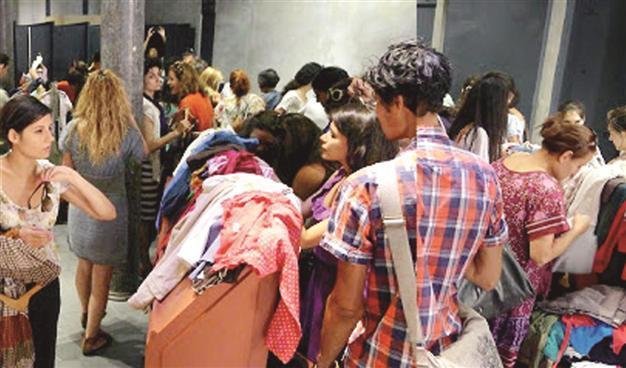Give the 'gift economy’ a chance this holiday season
Emrah Güler

Giysi Takası (Clothes Swap) organizes regular gatherings in Istanbul where people bring second-hand clothes for swapping.
‘Tis the holiday season. ‘Tis the season of joy and gratitude and giving. And spending unnecessary amounts of money on gifts sure to be thrown in a corner after the season is over. Scented candles, ornaments of adorable angels and reindeer, objects that seem immensely appealing just because they are red and green call us from the shop windows at the shopping malls. Or not.
Wouldn’t you want to spend next to nothing to get meaningful gifts for loved ones? And get rid of that unused bread machine, or make sure that the book you have loved but no longer want to keep goes to someone that will enjoy it as much, in the process? The gift economy, the sharing economy, crowdfunding, collaborative consumption and the mesh economy are becoming more and more familiar words in Turkey as emerging alternative markets and communities to today’s market-based, monetized economy.
“Community is nearly impossible in a highly monetized society like our own,” said Charles Eisenstein, the popular speaker, teacher, and the author of “Sacred Economics: Money, Gift & Society in the Age of Transition,” in one of his essays. “That is because community is woven from gifts, which is ultimately why poor people often have stronger communities than rich people.”
In his book, and many of his essays, Eisenstein portrays a picture of transformation from a financial system to a gift economy, “better reflecting our emerging sense of interrelatedness.” That picture of transformation is becoming all the more evident in Turkey with increasing number of such communities, and their growing popularity, thanks to the Internet and social media.
Swapping clothes and more
Having made the news on a TV channel with the headline, “money has no value in this shop,” Giysi Takası (Clothes Swap) is a community that organizes regular gatherings in Istanbul where people bring second-hand clothes for swapping. “Dresses, bags, shoes, gloves, scarves, hats, belts, ties” are all some of the things that the community trades.
“Bring the clothes you are bored with, the ones you haven’t used, you no longer liked once you brought them home, that are now big, or small, gifts that you didn’t really like, and take home others you like,” organizers said. You are allowed to bring in no more than five pieces for swapping, and the leftovers are donated to a charity or an NGO at the end of the event.
For those hoping to swap more than clothes, and in the comfort of their living room, in front of their computers, the worldwide network of non-profit “gifting” groups, the Freecycle Network is available locally in Istanbul as well. The grassroots movement with the tagline “Changing the world one gift at a time” is made up of over 5,000 groups and about 9 million members around the world. The network provides a platform where members can offer and receive free items for reuse or recycling. Check out the freecycleistanbul Yahoo Group.
You can also check the Eşya Kütüphanesi (Library of Stuff), a sharing platform that works through esyakutuphanesi.com, as well as social media, where lenders and borrowers are matched, location being the most important criteria. The platform was established in 2012 by two young entrepreneurs, Aysu Erdoğdu and Ayşe Gökçe Bor, after taking the first place in the Startup Weekend Istanbul competition.
Sharing platforms for book lovers“What we are trying to achieve with the Library of Stuff is to revive the sense of sharing and solidarity seen in the old neighborhoods through using the Internet,” said Erdoğdu in an earlier interview in Hürriyet Daily News. “We try to facilitate borrowing and lending through our website. You can become a member, lend your stuff or you can check who has the item you need, so that you can borrow.”
For bookworms, there are two platforms that give you a chance to lend and borrow books, and even engage in conversations about the books. BookSerf, founded by two young entrepreneurs, Erbil Sivaslıoğlu and Kerem Sun, lets you lend and borrow books for two weeks. You can upload your library on the site and share them with fellow book lovers.
“We like them so much that it hurts us to watch them gather dust on our libraries. Not to mention how high the prices of books have gotten in our digital age,” calls Sivaslıoğlu and Sun to BookSerfers. “We set out to create a community where people can share their books, meet other like-minded readers, and talk about literature and life.” Check BookSerf.com for this customized online book club.
The website Kitap Ağacı (The Book Tree), at kitapagaci.org, is another platform for book lovers. Unlike BookSerf, here you can either donate books or find books donated by others. Founded in 2009, the tagline of the site is “People grow as they read.” Kitap Ağacı lets you have your book listed for one year. You can search for books in your region as well. Happy (and less expensive) holidays!
